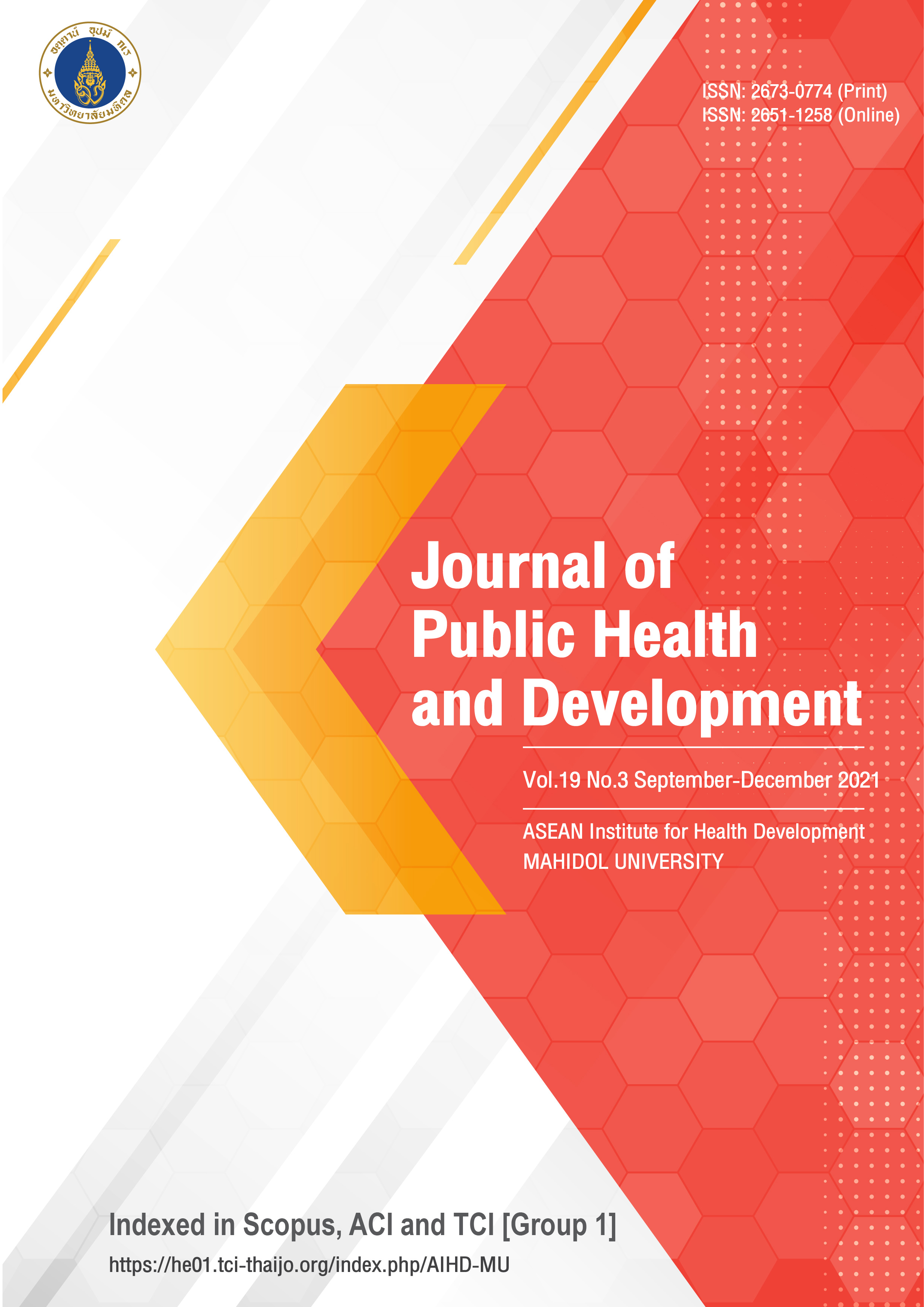A preventive communicable disease model: a case study for remote tribal communities in Thailand
Main Article Content
Abstract
The study aimed to describe a model of communicable disease control and prevention in remote areas. The model stemmed from a concept developed from two case studies comprising different social and cultural contexts. A qualitative randomized snowball technique was conducted for 16 participants by including in depth semi-structured interviews and nonparticipation observation was used to collect data combined with field notes. The data were collected, analyzed and synthesized based on qualitative research techniques using content analysis and grounded theory technique for model construction. The research findings showed that the model of preventive communicable diseases consisted of 2 important external and internal elements of the development process. The external elements included policy, cultural context, social support, team strength, communication, learning processes, proprietorship, participation, social capital and community strength. Additionally, the internal elements included 3 project phases of initiation, implementation and evaluation where strategies and activities related to each stage were employed. As the research findings indicated, the model could be applied to improve community health especially in a community where communicable diseases included villager’s health hazards. This entailed a concept for the development team to apply by increasing and decreasing the number of variables based on appropriate concepts matching the area and community being developed.
Article Details

This work is licensed under a Creative Commons Attribution-NonCommercial-NoDerivatives 4.0 International License.
References
United Nation. Community development [Internet]. [cited 2020 May 5]. Available from:https://canadianglobal response.ca/portfolio/community-development/.
Fawcett BS., Paine-Andrews A., T. Francisco TV., Schultz AJ., Richter PK, Lewis KR, et al. Using empowerment theory in collaborative partnerships for community health and development. Am J Community Psychol. 1995;23(5): 677-697.
Perkins DD., Zimmerman AM. Empowerment theory, research, and application. Am J Community Psychol. 1995;23(5): 569-579.
Zimmerman AM., Israel AB., Amy Schulz, Checkoway B. Further explorations in empowerment theory: an empirical analysis of psychological empowerment. Am J Community Psychol. 1992;20(6): 707-727.
Zimmerman AM. Psychological empowerment: issues and illustrations. Am J Community Psychol. 1995;23(5): 581-599.
Teoh KG, Tan PM, Tan SJ, Chong CM. Conducting community‐based participatory research in an urban Malaysian community: lessons learned and challenges in establishing partnerships. J Community Appl Soc Psychol. 2018;1–13.
Buadaeng K. The rise and fall of the Tribal Research Institute (TRI):“Hill Tribe” policy and studies in Thailand. Southeast Asian Stud. 2006;44(3): 359-384.
Tambon Health Promoting Hospital LaoLieo. Annual Report Year 2016; 2016.
Tambon Health Promoting Hospital Puu Muen. Annual Report Year 2016; 2016.
Klai-nak C. The guideline of strengthening sustainable community participation. a conference document ; 2015.
Nak-ai W., Jiawiwatkul U., Temsirikulchia L. and Nontapattamadul K. Community public policy process for solving cadmium contamination problems in the environment: a case study of Mae Sod District, Tak Province. Kasetsart J. Soc. Sci. 2017; 39: 59-66.
Braun V, Clarke V. Using thematic analysis in psychology. Qual Res Psychol. 2006;3:77–101.
Reach G., Fompeyrine D., Mularski C. Understanding the patient multidimensional experience: a qualitative study on coping in hospitals of Assistance Publique-Hôpitaux de Paris, France. Patient Preference and Adherence. 2015;9: 555–560.
Nontapattamadul K. A qualitative study in social welfare: concept and methodology. Bangkok: Thammasart University Press; 2011.
Ministry of Culture. 2009. A master plan of national culture years 2007-2016 [Internet]. [cited 2019 December 13]. Available from: http://www.m-culture. go.th/ckfinder/userfiles/files/ toolsculture/AWFINAL%20BOOK%20WATTANATUM%20PLAN%20YEAR%2025-11- 52-1.pdf .
Kanjanaphan A.(editor). Identity of marginal people. Bangkok: Thai Health Promotion Foundation; 2004.
Racher EF. and Annis R. Community health action model: health promotion by the community. research and theory for nursing practice; 2008
Annis R., Racher EF. and Beattie M. Rural community health and well-being: a guide to action. Rural Development Institute Brandon University, Brandon, Manitoba, Canada; 2004.
Ryan Nicholls K., and Racher, EF. Investigating the health of rural communities:toward framework development. Rural Remote Health. 2004; 4:244. Available from: http://rrh. deakin.edu.au
Nontapattamadul K. The measurement of social support. Journal of social work 1992; 7(2):169-180.
Walaisatian P. The process and technique for developer working. Bangkok: The project of strengthening for happy community; 2000.
WHO/UNICEF. Report of the international conference on primary health care. NewYork: N.P. press; 1978.
Fukuyama F. Trust: Social Virtues and the Creation of Prosperity. NY: Free Press; 1995.
Romrattanaphan W. Social capital. Bangkok: The project of strengthening for happy community; 2005.
Nak-ai, W., Jiawiwatkul, U., Temsirikulchai, L., and Nonthapattamadul, K. The model of ethnic community public policy. Adv Sci Lett. 2017; 23: 1008-1011.
Norris, T. America’s Best Kept Secret: The Healthy Communities Movement. (Reprint by Healthy Communities Massachusetts from the National Civic Review, introduction, Spring, 1997.) Pan American Health Organization. Healthy Municipalities and Communities: Mayors’ Guide for Promoting Quality of Life. Washington, DC;2002.
Wilkinson, R., & Michael M. The Solid Facts: Social Determinants of Health. World Health Organization: Copenhagen;1998.
Wannaborworn U. Healthy public policy determination at the local level: acase study at Trang Municipality. Independent study for Master of Public Administration in Local Government. Khon Kaen University, Thailand; 2009.
Yotpanya K. The process of public policy building of Watboth Municipality, Watboth District, Phitsanulok Province. Independent study, Master of Public Administration in Public Policy. Naresuan University, Thailand; 2009


